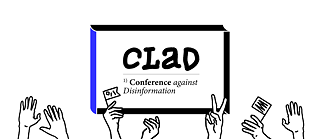Conference in Lisbon
In recent years, the proliferation of fake news and disinformation represents a significant challenge, despite global efforts to raise awareness of the issue. These issues have permeated various domains, such as newspapers or social networks, in academia, companies, political arenas or even as war strategies. The impact is far-reaching, affecting society in general and, more importantly, the lives of individuals who become victims of falsehoods and lies.
However, despite this challenging information landscape, a number of individuals and organisations across Europe remain dedicated in their efforts to combat these challenges. We are already seeing the promotion of media and information literacy on the old continent, with the aim of protecting the most vulnerable and devising effective strategies for each specific context. Society as a whole is mobilising to tackle this problem. The media are making remarkable efforts to safeguard journalistic truth, increasingly providing tools for regulation and fact-checking. Similarly, the academic community has shown particular sensitivity to the phenomenon, taking proactive measures in the training of students, supporting researchers with codes of ethics, and guiding teachers to adopt good practices in teaching accurate and appropriate content. These combined efforts aim to mitigate the spread of false information and disinformation, empowering individuals with the skills they need to successfully navigate the complex information landscape.
What about public libraries? How can we, through democratic participation and social cohesion, promote strategies such as information and media literacy? How can we help protect the integrity of the truth, maintain ethical standards and ensure that individuals are equipped to critically evaluate information in an ever-evolving media landscape?
At this international conference we see public libraries as places of encounter, debate and social learning, and we understand them as spaces of construction, creative places and social life, which favour community networking, access to education and self-training without limits. In addition, they are reliable institutions specialising in information, which makes them a natural partner in the fight against disinformation. The programme is organised to inspire librarians and civil society towards greater democratic participation in the fight against disinformation by debating and discussing these topics.
What about public libraries? How can we, through democratic participation and social cohesion, promote strategies such as information and media literacy? How can we help protect the integrity of the truth, maintain ethical standards and ensure that individuals are equipped to critically evaluate information in an ever-evolving media landscape?
At this international conference we see public libraries as places of encounter, debate and social learning, and we understand them as spaces of construction, creative places and social life, which favour community networking, access to education and self-training without limits. In addition, they are reliable institutions specialising in information, which makes them a natural partner in the fight against disinformation. The programme is organised to inspire librarians and civil society towards greater democratic participation in the fight against disinformation by debating and discussing these topics.


